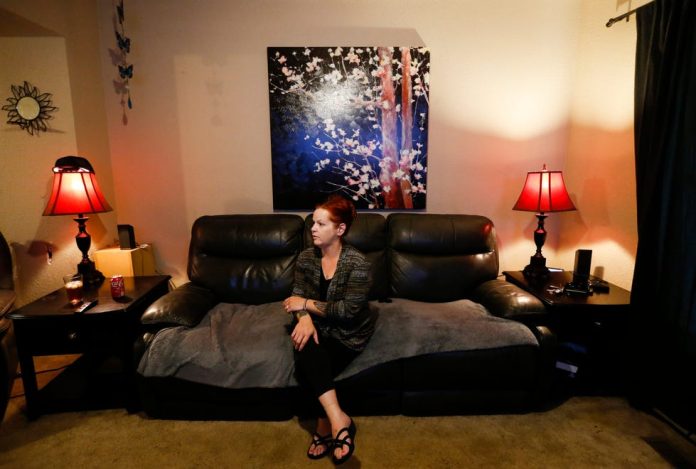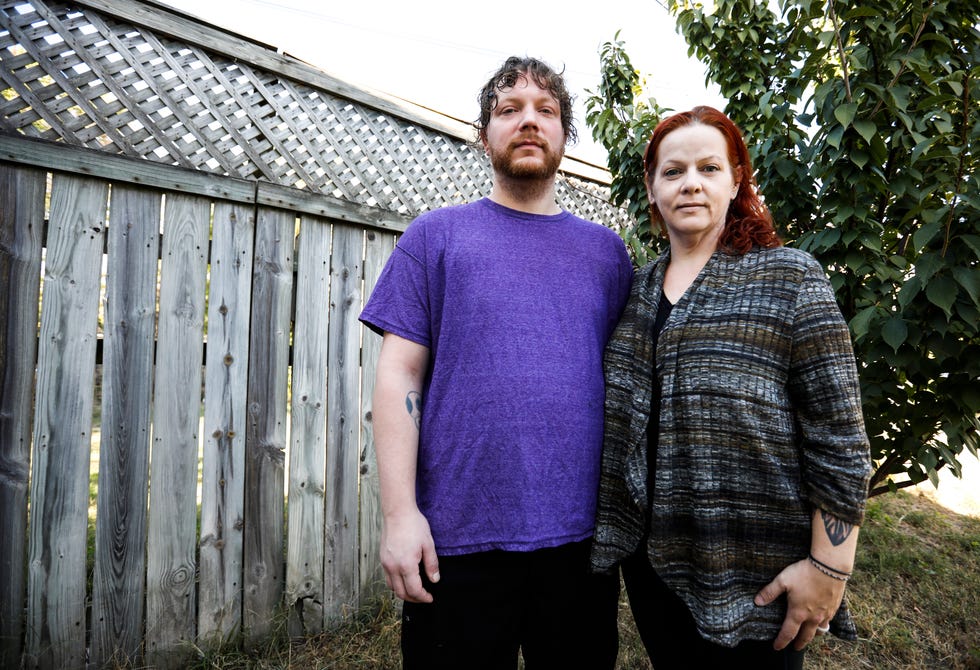- At 17 weeks and 5 days pregnant, Missouri resident Mylissa Farmer’s water broke, putting her life in danger. Her baby’s chances of survival were zero, doctors said.
- Doctors recommended terminating the pregnancy. But after Missouri banned abortions, that wasn’t an option in the state.
- Farmer fears if medical professionals in states restricting abortion, like Missouri, will be able to offer patients necessary care.
SPRINGFIELD, Mo. – At 6:30 a.m. on Aug. 2, nearly 18 weeks into her pregnancy, Mylissa Farmer experienced what doctors call a preterm premature rupture of membranes – her water broke before labor, followed by vaginal bleeding, abdominal pressure and cramping.
She went to Freeman Hospital in Joplin, Missouri, where she’d been just the day before. Everything had been normal then. She and her boyfriend, Matthew McNeill, had already picked out a name for their daughter: Maeve.
But the doctors had devastating news for them.
If Maeve was delivered right then, chances of survival at 17 weeks and 5 days were zero, according to the assessment and plan section of Farmer’s medical records outlining the visit. And the outcome wasn’t much better if they tried to hold off on delivery.
The doctors recommended terminating the pregnancy – but 39 days after the state of Missouri banned abortions, that wasn’t an option, at least not in Missouri.
Post-Roe:Walgreens, CVS pharmacists are withholding medications for people. What you need to know.
A year ago, the hospital could have offered a chance for the couple to say goodbye and hold their daughter, even though they knew she wouldn’t survive outside the womb.
Instead, Farmer and McNeill were left to make a series of trips across three states and countless phone calls.
The couple wanted to be able to grieve the loss of their daughter, not sit at home or in a hospital “with a baby dying inside me,” Farmer said.
“I know it sounds horrible, but we just wanted to finish the process,” she said.
In the end, Farmer didn’t just lose Maeve; she lost her friends and her trust that Missouri would allow medical professionals to do their jobs.
“It was hard. You could tell the doctors were trying to tell us what we needed to do, but at the same time, trying to protect themselves. We’re not angry with them,” Farmer said.
If her vitals plummeted or infection set in, or the fetus’ cardiac activity stopped, the doctors could intervene, but not before then.
“Current Missouri law supercedes (sic) our medical judgement and the MO law language states that we cannot intervene in the setting of a pregnancy with a positive fetal heart motion unless there is a ‘medical emergency,'” reads Farmer’s medical record from that Aug. 2 visit.
But the language outlining “medical emergencies” in Missouri Revised Statute 188.017 is vague, which continues to cause concern as the Missouri government fails to issue any meaningful clarification that carries the full force of the law.
Schools:In states where abortion is now outlawed, students ramp up activism
More:Amid growing ‘abortion deserts,’ a haven in small-town Illinois takes shape
At 41, Farmer worried that, by the time there was an emergency, it would be too late for both her and Maeve. And even if Farmer did live through it, she worried about what her recovery would be like.
She was already at “risks of maternal thrombosis given her history of (deep vein thrombosis during a COVID-19 infection), infection/sepsis, severe blood loss, hysterotomy, hysterectomy and even mortality,” according to the medical record.
Even if Farmer could carry Maeve another six weeks and deliver her, the complete loss of amniotic fluid meant stunted development.
“They said because I lost all of my amniotic fluid, that my uterus would be deforming our child and if we were able to carry another 6 weeks, she would come out deformed,” Farmer said. “Her lungs wouldn’t be any more developed than they were at 17 weeks … If she were to develop, she would come out deformed and with major disabilities with breathing, and she’d be on a ventilator for a very long time.”
The situation was further complicated when doctors found that Farmer’s cervix was dilated, which increased chances that she would develop an infection and meant “there was no chance for me to even regain any amniotic fluid,” she said.
Freeman Hospital in Joplin said it cannot comment on Farmer’s case “because it is a patient privacy HIPAA issue, which is hospital policy.”
Searching out of state proved fruitless
Farmer’s options were limited in Missouri: “Sit and wait in the hospital for however long it took for her heartbeat to either stop, or for infection to set in or for me to bleed to death. We didn’t like those options.”
Doctors suggested she and McNeill travel out of state to receive care. But after calling four hospitals in Illinois and three in Kansas, it seemed no one would take them.
They even drove to Kansas University Medical Center in Kansas City, Kansas, that same day, where she said doctors told her the same thing she’d heard in Joplin: “This child is not viable. Your health is at risk.”
But after consulting with their legal team, Farmer said they told her that they wouldn’t be able to offer a dilation and evacuation procedure.
“Our providers evaluate each case individually to develop an appropriate treatment plan, and then discuss the options and alternatives for care with our patients,” said Jill Chadwick, KUMC director of media relations. “Those are the medical decisions our physicians are trained to make every day, and at the same time always staying within the boundaries set forth by Kansas law.”
Farmer returned to Freeman Hospital on Aug. 3, staying overnight for observation and looking up stories about water breaking early after a nurse mentioned that antibiotics might allow Farmer to carry to term without infection.
But reality came crashing down when more doctors came to advise them.
One newborn intensive care unit doctor “went over the whole baby being deformed because their bones are so soft, she would have permanent disabilities the rest of her life even if she made it,” Farmer said. “But he said because my cervix was open, there was no chance for me to even make it 6 weeks.”
“The thing he said was, ‘There are things worse than death, and I have seen it.'”
Abortion ruling’s rapid impact:66 clinics have stopped doing procedure in these 15 states
Rather than stay at the hospital to wait for infection to set in, Farmer went home to wait, monitoring her temperature and her pain. On Aug. 4, she called her state senator, Bill White, and explained her situation to an aide.
He told her, “That’s not what the law was designed for. It’s designed to protect the woman’s life.”
“It’s not protecting me. We have to wait for the heartbeat (to stop). There’s no chance for a baby; she’s not going to make it. It’s putting my life in danger,” Farmer said she remembers telling him. “We just want to move on, we just want to grieve.”
The aide told her he would reach out to Missouri Attorney General Eric Schmitt, and also connected her with Choices Medical Services, “which is basically an anti-abortion clinic” in Joplin, Farmer said. She never heard back about what Schmitt said.
Choices Medical Services offers “pregnancy testing for confirmation of pregnancy, limited obstetrical ultrasounds, STI/STD testing and prenatal education classes.” According to the website, it does not offer nor refer people to abortion services.
“We are often contacted by individuals who request an appointment, but their specific needs are out of the scope of our services,” said Mischa Long, director of nursing for Choices Medical Services in Joplin. “For these individuals, we clarify our services and offer a referral to a local doctor for prenatal care.”
Farmer’s situation turned out to be one such case.
Despite the clinic’s compassion, they were “unable to give any answers to help my medical situation. In my case, it was unhelpful and slowed my progress for actual care,” Farmer said.
What’s everyone talking about? Sign up for our trending newsletter to get the latest news of the day
An abortion clinic was Farmer’s ‘last hope for care’
Farmer describes herself as “pretty pro-life” and Christian. She then did something she never thought she would do: Begin looking for abortion clinics.
Planned Parenthood in Kansas, she said, was overbooked. They couldn’t find anyone in Illinois. It was looking like they would have to travel to Colorado.
After reaching out to a couple abortion services that help with finances and facilitating the procedure, one person contacted the Illinois HOPE Clinic for Farmer.
“I got a call an hour and a half later, they said, ‘Your case needs to be urgent; we are going to see you tomorrow,'” she said.
Farmer and McNeill set out for Granite City, Illinois. Early in the morning on Aug. 5, Farmer began to have back pain while on their way to the place just 15 minutes outside of St. Louis. When she got to HOPE Clinic, she was in labor.
For subscribers:Post-Roe, non-pregnant people are being denied medications over ‘hypothetical’ babies
Traveling for Abortion:New executive order safeguards people traveling to Hawaii for abortion procedures
After the fact, Farmer said it was almost reassuring that the labor came on. Friends in Joplin who knew of the situation had been telling her that she “could give birth at 17 weeks, that they knew people who have done it, that I was killing my child.”
“It did my heart good to know I was doing the right thing,” she said, as if her body was telling her that it was OK.
But still, the experience was harrowing. Protesters in front of the clinic echoed the things her friends had told her, “saying we were killing our baby and that we were evil.”
“It was awful, you know? We were just going through so much. We didn’t want this … but at the same time, we had no choice,” Farmer said.
Because labor had already started, what was supposed to be a two-day procedure was cut down to one. The clinic performed the procedure, Farmer and McNeil stayed there for one night, and then returned home. Farmer returned to her job Aug. 11.
“The doctor wanted me to take more time but we weren’t prepared for anything this early,” she said.
She had already missed more than a week of work, and while her life had ground to a halt, there were still bills to pay.
‘Lost trust’ in ability to get needed care
Farmer and McNeill are still grieving the loss of much-wanted Maeve. Farmer said they took all the extra steps and extra care they could to ensure the pregnancy was successful. She is quick to point out that hers was not an elective abortion.
“We wanted this child. We named her after a warrior queen,” McNeill told the Springfield News-Leader, part of the USA TODAY Network, standing in the kitchen of their Joplin home at the end of September.
Farmer added that they had already bought clothes for Maeve, and that she would have been a daddy’s girl.
If they had been able to get the care they needed in-state, McNeill feels things would have been different. Though their daughter would have died, at least Farmer would have been able to deliver her close to home, among friends and support.
“If this was a year ago, they could have induced labor and I would have been able to hold her and say goodbye,” McNeill said.
Along with the grief, Farmer is frustrated.
She and McNeill have been encountering difficulty as they searched for attorney who might take their case. As of mid-October, Farmer told the News-Leader they secured legal counsel.
Health:Lung disease tests are failing Black patients, studies show. Experts are calling for change.
Period Action Day:1 in 4 struggle to buy menstrual products. 22 states still tax them.
During a visit with the News-Leader in September, Farmer explained they aren’t seeking money in return for the emotional pain they’ve endured – they just want people to be aware of the situations that will arise if they miscarry before viability.
“This isn’t for us. It’s for other women, to help other people,” she said. “I don’t know what else we can do to try to make people more aware.”
The loss isn’t limited to their child.
The friends who told her she was killing her child have since been cut out of her life.
“I either told them not to contact me or unfriended them, because we were getting judged harshly,” Farmer said. “It was just more insult to injury that people are so uninformed and so unsympathetic.”
Since their ordeal, Farmer has lost trust. While she still feels her obstetrician at Freeman Hospital in Joplin is a good doctor, she’s worried about whether medical professionals in Missouri will be able to offer patients necessary care.
“I haven’t lost trust in care, but I’ve lost trust (doctors) will be allowed to make the medical decisions they need to make,” she said.
She’s lost trust in the politicians who represent her, as well.
Despite reaching out to various legislators, she has yet to receive an answer that satisfies her: Why is this law written this way? If it’s to protect women, why did she have to be in danger before she could get care in-state? Why is it such a binary law?
“The world is too nuanced to put such strict rules in place,” Farmer said.
What is preterm premature rupture of membranes (PPROM)?
Farmer’s story is not unique. According to the American College of Obstetricians and Gynecologists, preterm premature rupture of membranes happens in 2% to 3% of pregnancies in the United States, and leads to preterm birth in one out of four cases.
Generally, a person’s water will break when contractions begin. Any time the amniotic sac breaks before labor starts, it’s called prelabor or premature rupture of membranes, but when the sac breaks before the 37th week of pregnancy, it’s considered preterm.
Amniotic fluid – a liquid that is initially made up of mostly water from the mother – creates space for movement in the womb, allowing for bone growth. The fluid also allows the lungs to develop properly, so a complete loss of the fluid inhibits development and can cause the uterus to crush the fetus.
Experts:Pregnancy-related deaths could rise 20% or more in states that outlaw abortion
Until about 36 weeks of pregnancy, the volume of amniotic fluid continues to increase.
Generally, the age of viability – the time at which the infant can survive outside the womb – is 24 weeks, though advances in medical research mean that the prognosis for earlier delivery is better than it has been in the past.
In Farmer’s case, the amniotic sac broke and she lost all of the amniotic fluid at 17 weeks and 5 days into her pregnancy, 20 weeks before her pregnancy would be at term, and a little more than six weeks before her baby would be at the cusp of viability.
Follow Susan Szuch on Twitter: @szuchsm.




